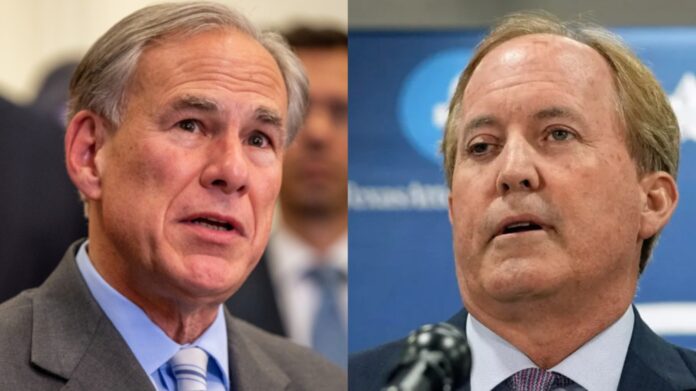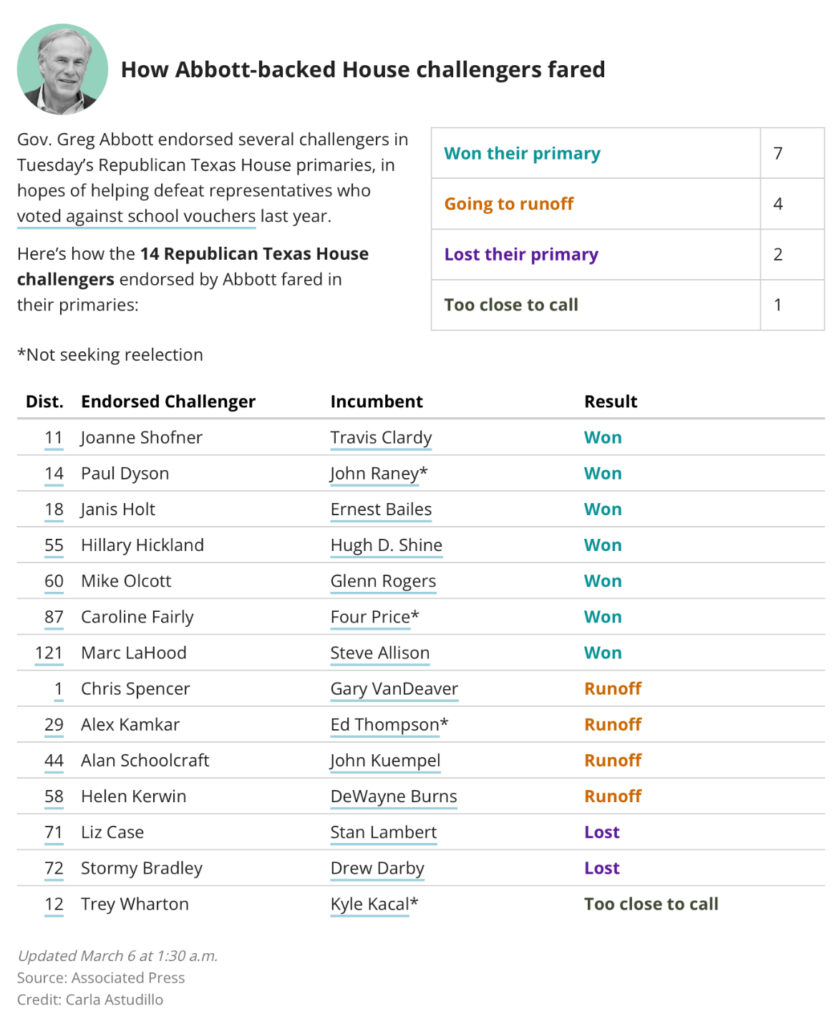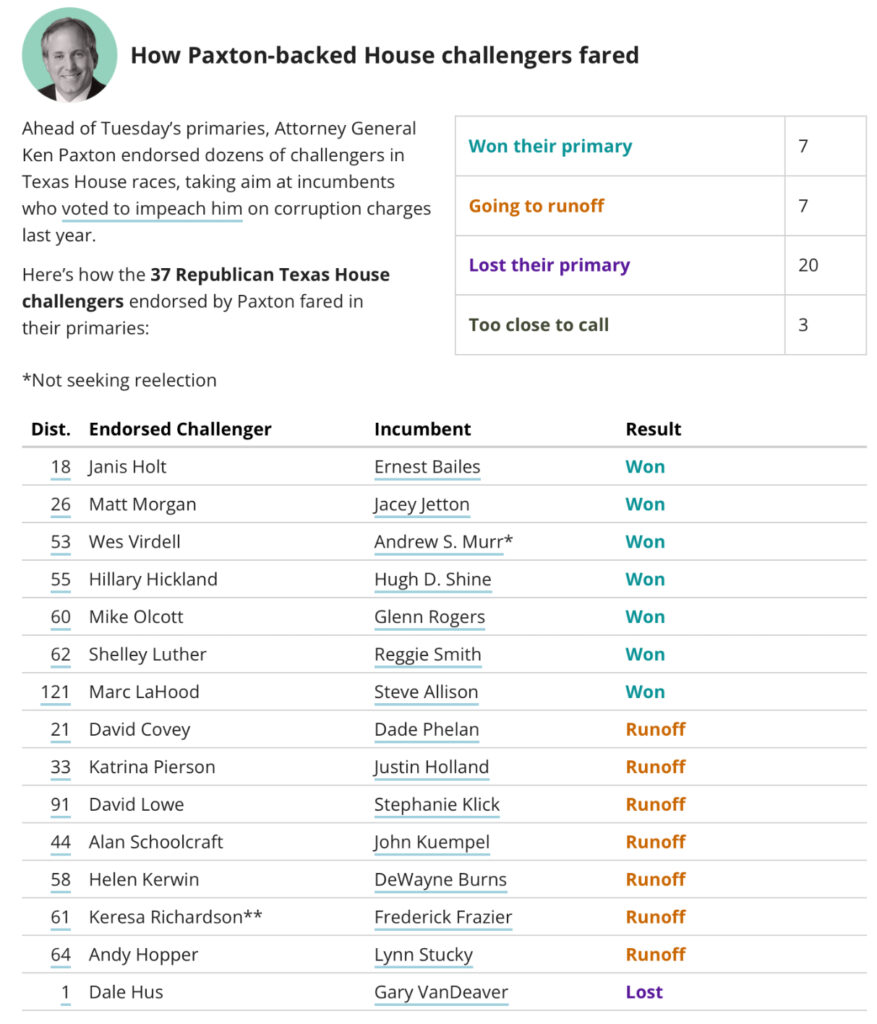The two state leaders and other prominent Republicans, like Lt. Gov. Dan Patrick and former president Donald Trump, endorsed challengers in dozens of races citing the incumbents’ disloyalty to the party.
In a victory for Gov. Greg Abbott and Attorney General Ken Paxton, at least nine House Republicans appeared to have lost their primaries on Tuesday evening.
Another eight members, at least, were also forced into runoffs this May 28 — including House Speaker Dade Phelan who was the No. 1 target of the far right.
The two state leaders and other prominent Republicans, like Lt. Gov. Dan Patrick and former president Donald Trump, endorsed challengers in dozens of races citing the incumbents’ disloyalty to the party.
The Tuesday night drubbing serves as a cautionary reminder that elected Republicans, regardless of their seniority and length of tenure, cross the party’s base at their peril. Challengers and their surrogates framed the Texas House as an institution that catered to liberals and thwarted the conservative priorities.
In particular, Abbott vowed revenge on those House Republicans who helped kill his signature legislative priority to pass school vouchers and Paxton separately targeted Republicans who voted to impeach him last summer.
As many challengers attempted to outflank incumbents on the right, the result signals that the House will likely continue to embrace more conservative policies. It will also become more receptive to school vouchers.
“Republican primary voters have once again sent an unmistakable message that parents deserve the freedom to choose the best education pathway for their child,” Abbott said in a statement Tuesday evening. “We will continue to help true conservative candidates on the ballot who stand with the majority of their constituents in supporting education freedom for every Texas family.”
Among those candidates who appeared to have lost outright: Steve Allison of San Antonio, Ernest Bailes of Shepherd, Travis Clardy of Nacogdoches, Jill Dutton of Ben Wheeler, Jacey Jetton of Richmond, Glenn Rogers of Graford, Hugh Shine of Temple, Reggie Smith of Sherman and Kronda Thimesch of Lewisville. Thimesh lost her election by less than 300 votes putting her within the margin for a recount.
The eight members who appeared likely to face runoffs are Phelan, DeWayne Burns of Cleburne, Justin Holland of Rockwall, Stephanie Klick of Fort Worth, John Kuempel of Seguin, Frederick Frazier of McKinney, Lynn Stucky of Denton and Gary VanDeaver of New Boston. The runoff is May 28.
Among the casualties, Burns, Kuempel, Smith and Klick were committee chairs. Shine and Clardy each have served six terms.
The results suggest that Abbott is within striking distance of compiling a House membership that will allow public funding to be spent on private schools. For years, rural House Republicans have stood as a firewall blocking such legislation from passing in Texas.
Based on the vote on the House voucher bill last November, Abbott needed to pick up 11 pro-voucher votes. Before the runoffs, he already had nine more supporters.
Paxton’s campaign to oust House incumbents who supported his impeachment last year was less successful. Just five of the 35 challengers he endorsed won outright, with another five headed to runoffs. A handful of other races had not yet been called as of early Wednesday morning.
Among the winners who are expected to pull the chamber to the right is Shelley Luther, a Dallas salon owner who was jailed in 2020 for defying Abbott’s COVID-19-era business shut down and called Abbott a “tyrant governor.”
Brent Money, an Abbott- and Paxton-backed challenger, declared victory for true conservatives.
“Tonight’s victory goes to the conservative people in this district who are desperate for a conservative fighter in Austin,” Money said in a statement.
Two leaders of the impeachment push, David
Spiller of Jacksboro and Jeff Leach of Plano, both won easily. Yet it was Mitch Little, one of Paxton’s impeachment defense lawyers, who unseated Thimesch.
A notable victory for Paxton was helping force Phelan into a runoff against former Orange County Republican Party Chairman David Covey — the first time a House speaker has been pushed into a runoff since 1972. Paxton, who last year called on Phelan to resign as speaker, campaigned for Covey in Beaumont.
At times, Abbott and Paxton were working against each other.
In the eight instances where Abbott and Paxton backed different candidates, Abbott’s choice won outright four times, Paxton’s pick won once and the remaining headed to runoffs or were too close to call.
Abbott’s notable losing candidate was Jetton, who sponsored one of the border security bills last year, and schlepped to Fort Bend County to campaign for him. But he lost by double-digits to Paxton-backed Matt Morgan.
But it was not a total shellacking for incumbents opposed by Republican leaders.
Members prevailed against often well-funded opponents backed by Republican leaders. In Abilene, Stan Lambert narrowly survived a challenge from Liz Case, who was endorsed by Trump and for whom Abbott held a rally. Drew Darby, an unapologetic opponent of vouchers in San Angelo, cruised over Stormy Bradley.











